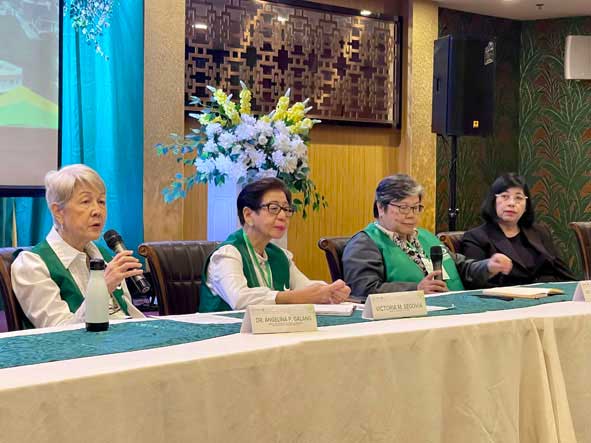
By Mariela Angella Oladive
As climate-related disasters escalate globally, the 5th Philippine Environment Summit called for urgent climate action, emphasizing individual responsibility in reducing carbon emissions.
Organized by Green Convergence and the Department of Environment and Natural Resources (DENR), the summit gathered environmental advocates, policymakers, and industry leaders from Feb. 19 to 21 at the Grand Xing Imperial Hotel in Iloilo City.
Themed “Ako Ang Bukas: Quantum Leap to Climate Neutrality,” the event focused on the need for large-scale, immediate action to combat climate change. It also introduced a carbon footprint calculator to help individuals and organizations measure their emissions.
Green Convergence trustee and “Ako Ang Bukas” Program Director Dr. Angelina P. Galang stressed the importance of accurately tracking emissions. “We reduce, reuse, and recycle. We conserve electricity, water, and materials. But we need to go further by measuring how much we are affecting the climate. We must track our impact by measuring our carbon footprint,” she said.
Galang explained that the organization developed a calculator to measure an individual’s carbon emissions. By using it regularly, users can track their progress and determine whether they are successfully reducing their footprint.
She urged individuals, households, businesses, and even religious institutions to adopt carbon tracking as part of their commitment to fighting climate change.
“The world is getting hotter, affecting atmospheric and water currents, leading to terrible typhoons and disastrous droughts. When we say ‘Ako Ang Bukas,’ or ‘I am the future,’ it means we are responsible for what tomorrow will bring,” she added.
She also noted simple ways individuals can help reduce carbon emissions, such as switching off lights during the day, using reusable bags, recycling plastic bottles, walking instead of driving short distances, and conserving water.
Galang emphasized that the global goal is to achieve carbon neutrality by 2050, with the Philippines working to minimize its own carbon contribution.
Meanwhile, Green Convergence President Victoria Segovia highlighted the urgency of mitigation and adaptation measures.
“Just around us, we see the chaos climate change is causing—wildfires in California, ski competitions in Europe struggling due to lack of snow, and here in the Philippines, stronger typhoons and unpredictable weather patterns. Global warming is not just an environmental issue but a direct threat to our way of life,” Segovia said.
She pointed out that while international climate negotiations remain contentious, local action is crucial.
“First-world and third-world countries often do not see eye to eye on financing climate solutions. Even political leaders like former U.S. President Donald Trump dismissed climate change. However, at the local level, many states and governments are taking action, regardless of global political disputes,” she added.
The event featured plenary discussions and breakout sessions with notable speakers, including DENR Secretary Ma. Antonia Yulo-Loyzaga, DENR Undersecretary for Finance, Information Systems, and Climate Change Atty. Analiza Teh, and First Philippine Holdings Chair Federico Lopez.
Also present was Fr. Gaël Giraud, SJ, research director for Georgetown University’s Environmental Justice Program, alongside sustainability experts and advocates.
Since its inception in 2016, the biennial Philippine Environment Summit has provided a platform for showcasing initiatives that balance environmental protection with socioeconomic progress. Previous summits were held in Cebu City (2018), Cagayan de Oro (2020), and Tagaytay City (2022).
The 2025 summit received support from the Energy Development Corporation, the Forest Foundation Philippines, and the Foundation for the Philippine Environment.
It underscored the need for policy direction, private sector accountability, and grassroots action as necessary steps toward achieving net-zero carbon emissions by 2050.





















